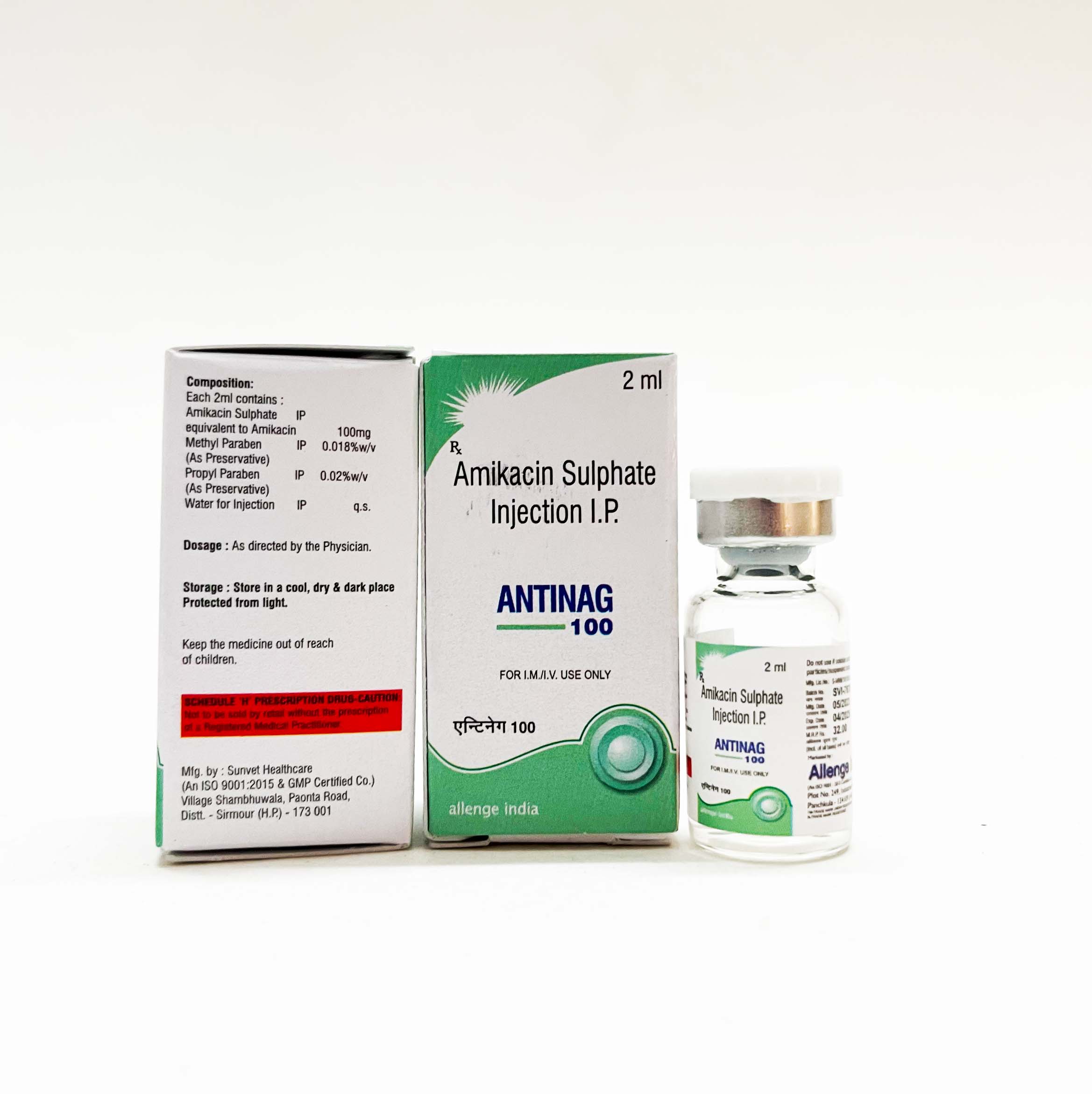ANTINAG injections provide highly effective antibacterial action with Amikacin, an aminoglycoside antibiotic used for treating severe Gram-negative bacterial infections. Available in three strengths. ANTINAG-100 (100 mg/2 ml), ANTINAG-250 (250 mg/2 ml), and ANTINAG-500 (500 mg/2 ml) – these injections offer flexible dosing for different infection severities. Amikacin works by inhibiting bacterial protein synthesis, making it a potent option for life-threatening infections, particularly those caused by multidrug-resistant bacteria.
Indications – When to Use ANTINAG Injections?
ANTINAG (Amikacin) injections are widely used in hospitals and critical care settings to treat serious bacterial infections, including:
Respiratory Tract Infections – Severe pneumonia, ventilator-associated infections
Urinary Tract Infections (UTIs) – Complicated and recurrent infections caused by resistant bacteria
Severe Skin & Soft Tissue Infections – Cellulitis, diabetic foot infections
Sepsis & Bloodstream Infections – Bacteremia, life-threatening infections
Intra-Abdominal Infections – Peritonitis, abdominal abscesses
Bone & Joint Infections – Osteomyelitis, septic arthritis
Tuberculosis (TB) Treatment – Used in combination with other anti-TB drugs
ANTINAG injections should be used only under medical supervision, especially in critically ill patients.
Dosage & Administration
The dosage of ANTINAG injections depends on infection severity, renal function, and patient weight.
Adults & Children
- 15 mg/kg/day, divided into two or three doses
- Maximum daily dose: 1.5 g
Newborns & Premature Infants
- 10 mg/kg as a loading dose, followed by 7.5 mg/kg every 12 hours
Route of Administration
- Administer intramuscularly (IM) or intravenously (IV)
- IV infusion should be slow (over 30-60 minutes)
Dosage adjustment is required for patients with kidney impairment. Always consult a physician for the correct dosing.
Precautions & Warnings
To ensure safe administration, follow these important precautions:
Monitor Kidney Function – Amikacin can cause nephrotoxicity, especially in elderly or renal-impaired patients.
Assess Hearing Function – Ototoxicity (hearing loss) is a potential side effect; regular monitoring is essential.
Avoid Mixing With Other IV Drugs – Amikacin should be administered separately to avoid drug interactions.
Use Caution in Pregnancy & Breastfeeding – Amikacin may harm fetal development and should be used only if absolutely necessary.
Monitor Blood Levels – Toxicity risk increases if blood levels exceed the recommended range.
Possible Side Effects
ANTINAG injections are generally well-tolerated, but some patients may experience:
Nephrotoxicity (Kidney Damage) – Increased creatinine levels, decreased urine output
Ototoxicity (Hearing Loss) – Ringing in the ears, dizziness, or balance issues
Neuromuscular Reactions – Muscle weakness, respiratory depression (rare)
Gastrointestinal Issues – Nausea, vomiting, diarrhea
Injection Site Reactions – Redness, swelling, or pain at the injection site
If any severe side effects occur, stop use immediately and seek medical attention.
ANTINAG injections offer fast-acting and reliable antibacterial treatment for severe infections that require hospitalization and intensive care. Amikacin’s potent mechanism ensures rapid bacterial elimination, making it a preferred choice for multidrug-resistant infections. With its broad-spectrum activity, low resistance rates, and high efficacy, ANTINAG provides a powerful treatment option in critical care.
Note : Always Consult a physician before taking any medication, and do not rely solely on this information for medical advice.
For more such product information and similar product category www.allengeindia.com/product-category/anti-bacterials
You can also contact us www.allengeindia.com/contact-us





